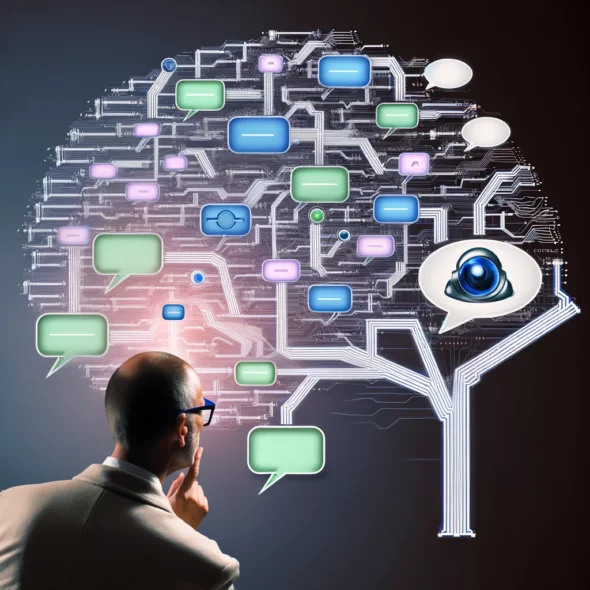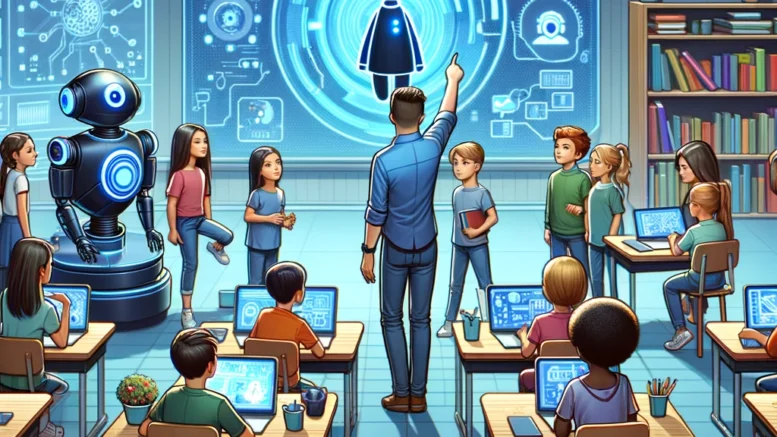By Jake Van Clief
Attention all educators: if you think artificial intelligence isn’t relevant to your teaching practice, think again. AI is not just some passing fad or niche technology. You wouldn’t say “I don’t know anything about google or JSTOR” at a job interview would you? That’s exactly what saying “I don’t know anything about AI” is going to sound like in just a few short years.
It’s a transformative force that is reshaping every aspect of our society, from healthcare to finance to art. And yes, that includes education.
As an academic and AI researcher, I’ve seen firsthand how AI is changing the landscape of learning. But I’ve also seen how many educators are struggling to keep up. They see AI as something distant from their day-to-day teaching, something that’s the domain of computer scientists and tech entrepreneurs. They couldn’t be more wrong.
Here’s the harsh reality: if you’re an educator today, you need to understand AI. Period. This isn’t optional anymore. It’s a core competency for 21st-century teaching. As I often say in my workshops and lectures, “You do not need to use AI in the class, but you do need to understand at least a little bit how it’s affecting your field of expertise.”
Why? Because AI is already shaping the world your students will inhabit and the skills they will need to thrive. It’s influencing the tools they use to learn, the content they consume, and the careers they will pursue. If you don’t understand AI, you can’t prepare your students for this reality.
But here’s where many educators get stuck. They hear about these AI applications and think, “That’s interesting, but I don’t know how to code an AI system. I don’t have the technical skills to use these tools in my teaching.” And so they tune out, assuming that AI is someone else’s problem.
But here’s the thing: you don’t need to be an AI developer to be an AI-literate educator. You don’t need to know how to code a neural network from scratch or optimize a machine learning algorithm. What you do need is a basic understanding of what AI is, how it works, and how it’s being applied in your field.

Let’s consider a few examples of what I mean by this.
If you’re an English professor, you already have the expertise to analyze language, narrative structures, and literary devices. Now, you can apply that same analytical lens to the language models underlying AI tools like GPT-3. You can examine the biases and assumptions encoded in the training data, the stylistic patterns in the generated text, and the implications for traditional concepts of authorship and creativity.
If you’re a linguistics professor, you have a rich toolkit for studying the structure and function of language. Now, you can turn that toolkit towards understanding the ‘language’ of AI. You can analyze the syntax and semantics of the prompts used to interact with AI models, and study how those linguistic choices shape the outputs. You can compare the ‘dialects’ of different AI models and explore what they reveal about the assumptions and goals of their creators.
If you’re a political science professor, you’re well-versed in theories of power, governance, and social influence. AI provides a new arena to apply those theories. You can investigate how AI is shaping public discourse and opinion, how it’s being used in political campaigns and governance, and how it’s influencing the distribution of power in society. You can also examine the policy implications of AI and advocate for regulations that align with democratic values (This is something I am doing in my personal research).
If you’re a philosophy professor, you’ve grappled with deep questions about the nature of intelligence, consciousness, and morality. AI brings those questions into sharp practical focus. You can probe the ethical dimensions of AI systems, from bias and fairness to transparency and accountability. You can explore the philosophical implications of machine intelligence for theories of mind, agency, and personhood.
If you’re an anthropology professor, you have a rich understanding of how technology shapes culture and society. AI is a powerful new technological force, and it’s already reshaping human interactions and institutions in profound ways. You can study how different communities and cultures are adapting to and shaping AI tools, how AI is influencing traditional practices and belief systems, and how it’s transforming the very fabric of human societies.

The key point is that AI isn’t just a new tool to be used in your existing teaching and research practices. It’s a new phenomenon to be studied and understood through the unique lens of your discipline. By bringing your disciplinary expertise to bear on AI, you can help shape how this transformative technology is developed, applied, and governed. And in doing so, you can empower your students to be not just passive consumers of AI, but active participants in shaping its future.
I could go on, but the point is clear: there is no academic field untouched by artificial intelligence. This means that regardless of what or who you teach, AI is relevant to your work. It’s shaping the content of your discipline, the tools of your trade, and the context in which your students will apply their learning.
Think of it like a car. You don’t need to be a mechanic to drive a car. You don’t need to understand every detail of how the engine works or be able to fix it if it breaks down. But you do need to know the basics: how to start the car, how to steer, how to brake. You need to understand the rules of the road and the potential hazards. The same is true for AI in education.
As an educator, your job is not to build the AI tools, but to understand how to use them effectively and ethically in your teaching. Your job is to help your students navigate a world where AI is increasingly prevalent, by fostering the skills and knowledge they need to be critical consumers and creative users of this technology.

So what does this look like in practice? It starts with educating yourself. Take the time to learn about the AI applications in your field. Read articles, attend workshops, talk to colleagues who are already using these tools. Don’t be afraid to experiment with AI in your own learning and research. The more you engage with AI, the more comfortable and creative you’ll become in incorporating it into your teaching.
Next, bring AI into your classroom. Not as a gimmick or an add-on, but as an integral part of your curriculum. Use AI tools to enhance your students’ learning, whether it’s using language models to provide personalized writing feedback, or using machine learning to analyze data in a science lab. At the same time, encourage your students to think critically about AI. Discuss the ethical implications of these tools, the potential biases in their outputs, and the skills needed to use them responsibly.
But don’t stop at your own classroom. Share your experiences with your colleagues. Advocate for professional development opportunities around AI in education. Push your institution to invest in the infrastructure and support needed to make AI a core part of the educational experience.

This is not about chasing the latest tech trend. It’s about fulfilling our fundamental duty as educators in a changing world. Our job has always been to prepare students for the future, to equip them with the knowledge and skills they need to navigate complexity and change. In a world increasingly shaped by artificial intelligence, that means being AI-literate ourselves.
I know this can feel overwhelming. The pace of change in AI is dizzying, and it’s tempting to hope that this cup will pass from our lips. But as educators, we don’t have the luxury of ignoring the defining technological shift of our time. Our students are counting on us to guide them through this new landscape.
So my challenge to you, fellow educators, is this: don’t wait for the AI revolution to come to you. Go out and meet it. Learn about it. Experiment with it. Bring it into your teaching in thoughtful and creative ways. And most of all, share your journey with others.
The future of education in an age of artificial intelligence is not yet written. But one thing is clear: it will be shaped by the educators who have the courage and the foresight to engage with AI today. Will you be one of them? The choice is yours, but the stakes could not be higher. Our students are counting on us.
Jake Van Clief is a senior at Flagler College studying Political Science with minors in International Studies and Religion, focusing on future governance and technology. He served in the U.S. Marine Corps as an Avionics and Cryptographic Technician, gaining extensive experience in various aircraft systems and cryptography. Through his company, Van Clief Media, he collaborates with a creative team to develop media using AI, art, writing, and programming. Jake is currently working on Eduba, a group chat and document creation platform for academics, while also applying to the University of Edinburgh to pursue a career as a political analyst and consultant in technology governance.



Be the first to comment on "Why educators must understand AI (even if they don’t use it)"